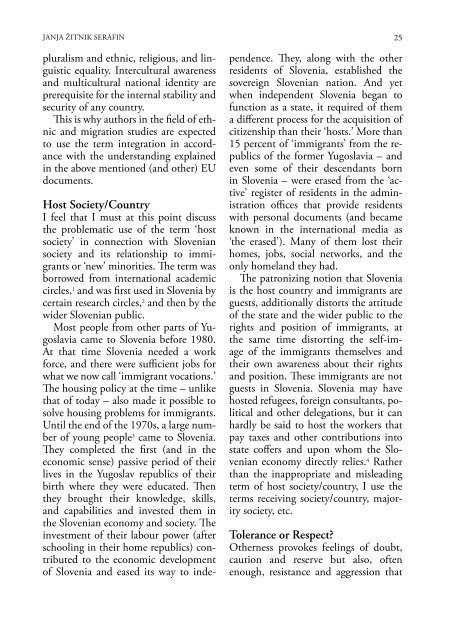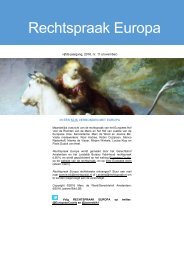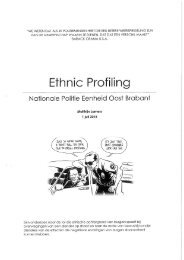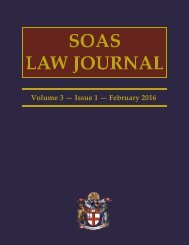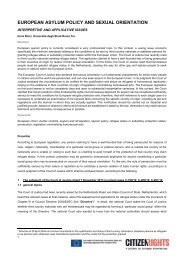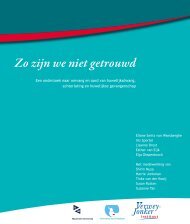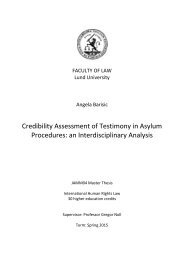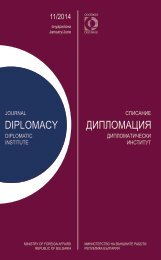AEMI
AEMI-2016-web
AEMI-2016-web
Create successful ePaper yourself
Turn your PDF publications into a flip-book with our unique Google optimized e-Paper software.
JANJA ŽITNIK SERAFIN<br />
pluralism and ethnic, religious, and linguistic<br />
equality. Intercultural awareness<br />
and multicultural national identity are<br />
prerequisite for the internal stability and<br />
security of any country.<br />
This is why authors in the field of ethnic<br />
and migration studies are expected<br />
to use the term integration in accordance<br />
with the understanding explained<br />
in the above mentioned (and other) EU<br />
documents.<br />
25<br />
Host Society/Country<br />
I feel that I must at this point discuss<br />
the problematic use of the term ‘host<br />
society’ in connection with Slovenian<br />
society and its relationship to immigrants<br />
or ‘new’ minorities. The term was<br />
borrowed from international academic<br />
circles, 1 and was first used in Slovenia by<br />
certain research circles, 2 and then by the<br />
wider Slovenian public.<br />
Most people from other parts of Yugoslavia<br />
came to Slovenia before 1980.<br />
At that time Slovenia needed a work<br />
force, and there were sufficient jobs for<br />
what we now call ‘immigrant vocations.’<br />
The housing policy at the time – unlike<br />
that of today – also made it possible to<br />
solve housing problems for immigrants.<br />
Until the end of the 1970s, a large number<br />
of young people 3 came to Slovenia.<br />
They completed the first (and in the<br />
economic sense) passive period of their<br />
lives in the Yugoslav republics of their<br />
birth where they were educated. Then<br />
they brought their knowledge, skills,<br />
and capabilities and invested them in<br />
the Slovenian economy and society. The<br />
investment of their labour power (after<br />
schooling in their home republics) contributed<br />
to the economic development<br />
of Slovenia and eased its way to independence.<br />
They, along with the other<br />
residents of Slovenia, established the<br />
sovereign Slovenian nation. And yet<br />
when independent Slovenia began to<br />
function as a state, it required of them<br />
a different process for the acquisition of<br />
citizenship than their ‘hosts.’ More than<br />
15 percent of ‘immigrants’ from the republics<br />
of the former Yugoslavia – and<br />
even some of their descendants born<br />
in Slovenia – were erased from the ‘active’<br />
register of residents in the administration<br />
offices that provide residents<br />
with personal documents (and became<br />
known in the international media as<br />
‘the erased’). Many of them lost their<br />
homes, jobs, social networks, and the<br />
only homeland they had.<br />
The patronizing notion that Slovenia<br />
is the host country and immigrants are<br />
guests, additionally distorts the attitude<br />
of the state and the wider public to the<br />
rights and position of immigrants, at<br />
the same time distorting the self-image<br />
of the immigrants themselves and<br />
their own awareness about their rights<br />
and position. These immigrants are not<br />
guests in Slovenia. Slovenia may have<br />
hosted refugees, foreign consultants, political<br />
and other delegations, but it can<br />
hardly be said to host the workers that<br />
pay taxes and other contributions into<br />
state coffers and upon whom the Slovenian<br />
economy directly relies. 4 Rather<br />
than the inappropriate and misleading<br />
term of host society/country, I use the<br />
terms receiving society/country, majority<br />
society, etc.<br />
Tolerance or Respect?<br />
Otherness provokes feelings of doubt,<br />
caution and reserve but also, often<br />
enough, resistance and aggression that


